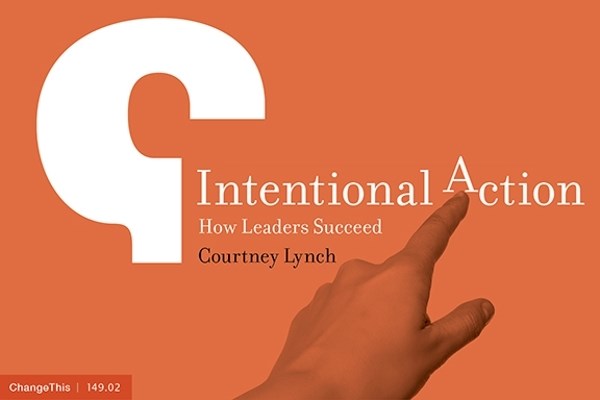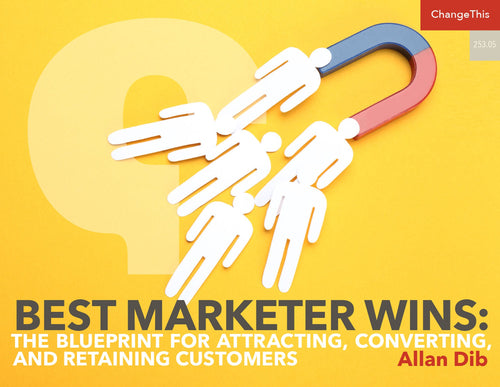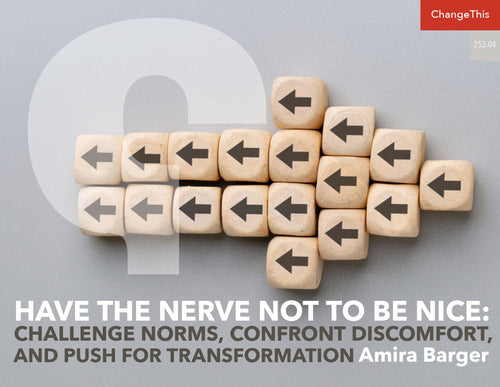Intentional Action: How Leaders Succeed
"Embracing the now includes understanding longevity and respecting that we are all still works in progress."

I have the coolest job.
Why? Every day I get to learn firsthand from talented, accomplished leaders. As a consultant who works with the world’s most successful companies, I have inside access to see how Board Members, CEOs, VPs, midlevel managers, and frontline workers make results happen. Being surrounded by talent all the time has taught me some powerful lessons. The most important one is that if the majority of the actions you take are intentional, you will be successful in the ways that matter most to you. Meaning, if you actually do what you want you will succeed. Sounds a little too good to be true, doesn’t it? Stay with me and I’ll show you how. But first, let me set the stage.
I recently turned 42. Not young, but not ancient, as my business partner Angie offered on the occasion. My birthday always inspires reflection. This year, I had two conversations around my birthday that left a strong impression. One took place in a well-appointed office on the top floor of a stately skyscraper and the other while I was sitting on a pile of sand on the beach.
Let’s go to the office first. I spent the day working with a talented CEO in his early sixties. We were discussing the leadership styles of his colleagues and he was talking specifically about a woman in his organization who was no longer a good fit. He admired her talent, praised her contributions and then remarked on how it would be best for her to leave the company. Sensing my surprise after hearing his glowing appraisal, he explained that she had so much talent, and “so much runway in front of her” (the woman was my age) and that she needed to be somewhere where she could level up and find new challenges. He admitted candidly that they didn’t see eye to eye on issues, yet his respect for her was strong. He wanted her to find a place she could flourish.
His remarks reminded me that people evolve, fit is fleeting, and often as leaders we have to make changes to keep progressing. Two weeks after our talk, I learned the woman had left the company.
Now, to the beach talk. That memorable conversation was with my dad. He’s 78. The sun was setting and we were watching my younger siblings playing with my kids on the beach. I was lamenting that I was old and my dad was telling me how young I was. (Thanks Dad!) Together we were recalling where he was at 42. After doing some rough math, we concluded that he was 42 in 1980. His whole life as I know it today was just beginning. Three months after turning 42, he married my amazing stepmother. At 42, he only had two of his five children. He was only 11 years into the career he would retire from decades later. At 42, my dad had a lot of runway in front of him.
While we never know exactly how many days are ahead of us, it can be quite valuable as leaders to see the expanse of runway in our futures. Whether we have five years or 25 years to retirement, knowing that we have time to recommit, reinvent or redo a decision is comforting. We are only stuck in time if we choose to be. I encourage you to imagine what’s next, what’s left or what’s still in your heart to become, and then take intentional actions toward bringing that vision to life. Embracing the now includes understanding longevity and respecting that we are all still works in progress.
To find powerful, lasing success, I encourage you to take the five steps all effective leaders take.
Step 1: Believe that you can choose how to lead your life.
When you fully believe that you can choose to lead your life in a direction that’s meaningful to you, you are on the cusp of greatness. Too many of us move through life as if we are in a trance. We go with the flow because we falsely believe that we have to. Trance mode means towing the line, focusing on what we think we have to do, versus truly understanding what we value and how capable we actually are.
I’m not advocating irresponsibility at all. Instead, I am talking about the value of being fully responsible to you first. That puts you in the best position possible to take responsibility for others. Being responsible to yourself first means knowing what you value, what you want, and how you want to contribute. Then, you demonstrate the courage necessary to commit to making your intentions reality. That’s leading your life.
Your values are the principles or qualities that are important to you—like fairness, family, humor, freedom, justice, humility, faith, or adventure. Your values are deeply personal, and whether you know it or not, you’ve been developing them your whole life. They’ve been inspired by your family, your religion, or powerful experiences, like the loss of a parent, the birth of a child, or a significant and hard-earned accomplishment. Values also evolve over time—what you valued as a teen may be very different from what you value as an adult.
What do you value most right now? For me it’s financial security, career challenge, a peaceful family and a fit body. Those values connect to my goals. When I am living most in sync with my values, the vast majority of my actions connect to at least one of them. When I am straying off the path to success that I’ve defined, it’s because I’m acting haphazardly or in a way that is obviously inconsistent with what I truly value.
When your values are active in your life, they can serve many purposes, from providing the hard line you don’t cross (I’m not going to engage in this accounting practice because I think it’s misleading), to showing you the way forward (I’m not going to have different standards for our team—I don’t think it’s fair). Values can serve as your North Star, guiding you when you’re making some of life’s important decisions (Should I take over the family business? Should I shift industries at this stage in my career?). A quick consultation with your values can lead you to a good choice. When you make difficult choices that align with your values, you’ll always find yourself sleeping better at night. On the other hand, when you make decisions without regard to your values, you can wind up asking yourself: Why doesn’t this choice feel right? Many poor choices can be avoided if we think first about our values before taking intentional action.
Step 2: Practice vigilant accountability.
Once you recognize what you value most, take a good long look at how you spend your days. Time is the great equalizer. It’s also the most important, nonrenewable resource we have that contributes to success. We all have the same opportunity to waste or leverage time. Don’t blame anything or anyone for how you use your time. What you do with your time is your life.
Whatever you do, do it on purpose. If you plan to relax, do so fully. If you plan to work, roll up your sleeves and get going. The key is to have intent for your days and then act accordingly. Becoming accountable to time is the gateway to full accountability in all areas of your life. The blame bandwagon goes nowhere. While it can be fun and socially acceptable to ride, it only takes you further and further away from your version of success. True leaders seek to take responsibility before they place blame on anyone or anything.
Demonstrating accountability also means relentlessly seeking ownership of mistakes, missteps, problems, and any other less than best outcome you are either responsible for or associated with.
We’re clearly not hardwired to be accountable when we feel challenged, but there’s no reason why we can’t learn to override our instincts and take intentional, accountable action during these critical moments. We absolutely can. It starts with being able to identify these critical moments when real accountability is needed in your life. And here’s a hint: these moments usually happen when you’re experiencing considerable frustration and things just aren’t going your way.
Step 3: Make Decisions that Matter
You are the sum of your decisions. The quality of your life, the strength of your relationships, the stress level you experience, and your career satisfaction are all a result of every choice you’ve made up to this point in life. So how are you doing?
Every time we come to a choice point in life we have the opportunity to shape circumstances, versus being at the mercy of them. When you want to do something, get started and keep going until you determine you don’t value the path you thought you did or you reach a barrier that can’t be overcome. The key to lasting success is to not screen yourself out of the running before you even get started. If you think you want to do something, start pursuing it right away.
Let’s say you’ve been considering going after a promotion, moving to another city or even adopting a child. Start stepping towards what you envision. By intentionally taking action towards what you want, you’ll learn great insights that clarify your desire to fully follow through on your vision. Or, you’ll gain perspective that allows you to see that your original intention is not in fact what you want after all.
Deciding to try is the most important step towards success we can take.
Step 4: Continue to raise your own expectations of yourself.
It’s critical to have intentions that are grand. We’re often much more capable than we give ourselves credit for. At 21, I joined the United States Marine Corps and would become one of just 1,000 female Marine Corps Officers in a Corps of 180,000. If someone had shown me a highlight reel of my time in uniform before I served, I would have watched with disbelief the endurance, tenacity and fitness I developed. My drill instructor used to tell us, “Mind over matter, if you don’t mind, it don’t matter,” emphasizing how it was more often our mind that held us back versus our body.
My growth as a leader allowed me to understand that leadership skills, like all skills, take time to develop. They are not innate. None of us are born leaders; we’re made into leaders. Acting with intention takes practice. Your self-development begins with developing the courage to lead your life in a direction you want. What I learned in the military is that courage isn’t the absence of fear; it’s the ability to take action in the face of fear.
Step 5: Find ways to serve others in your pursuits.
Intentional actions taken on behalf of others lead to life’s most joyous moments. To be of value and of service to someone else is one of the most rewarding things you can do. Even if you spend just ten minutes a day doing something for a friend, co-worker, family member or stranger, you’ll find yourself more energized, aware and better off.
Service is a counter instinctual behavior; we’re not born with service-based motivations. On the contrary, we’re born pretty selfish. Children and most teenagers don’t wake up thinking, “How can I help Mom today?” Service is even countercultural.
Our Western society reinforces total self-focus in the messages that bombard us every day; “Have it your way,” “Look out for number one,” or “Because you’re worth it.” With development, support, and context cues, we can shift our focus from self to others, but doing so doesn’t erase the instinct—it’s still there. Yet with the right level of awareness and discipline, it can be managed. When you’re able to demonstrate service to others, you quickly learn that the benefits of living life as a team experience far exceed any of the great results you can achieve on your own.
So there you have it. Five steps that when you take them will lead you to a life well led. I wish you the best on your leadership journey. I know your intentional actions will add great value to our world.
About the Author
Courtney Lynch has found success by living her life as a leader. Notable achievements include her nine years of service as a Marine Corps officer, managing a top-notch sales team for Rational Software, earning her law degree at William & Mary, practicing at one of the nation’s leading law firms, and creating Lead Star—a premier leadership development consulting firm that works globally with leading organizations. Courtney is the best-selling author of Leading from the Front and the new release Spark: How to Lead Yourself and Others to Greater Success, co-authored with Angie Morgan and Sean Lynch.











































